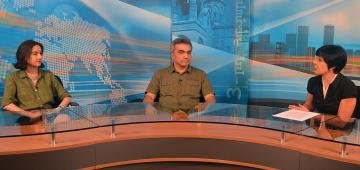 |
The Vectors of Foreign Policy of Post-Revolutionary Armenia and Inevitable Issues
What has changes in the foreign policy agenda of Armenia? Are those the vectors or the messages that have changed? Has the attitude of geopolitical centers to Armenia changed?
Expert in International Studies Anahit Shirinyan and political analyst Edgar Vardanyan discuss the topic.
The conversation is hosted by Anna Sargsyan.
|
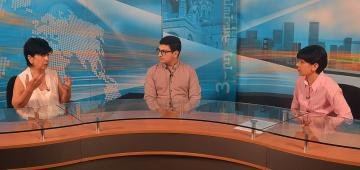 |
Media and the New Reality of Armenia
Recently, some media outlets disseminated an announcement and expressed their concerns over media activities. The announcement was addressed to the government. But the reason for the discussion was the changes in the media landscape. Are our perceptions on media changing? Is it the government to define the rules of the game in the media field? What does the public expect from the media and what the media expects from the government?
The director of "Region" Research Center Laura Baghdasaryan and media expert Harutyun Tsatryan discuss the topic.
The conversation is hosted by Anna Sargsyan.
|
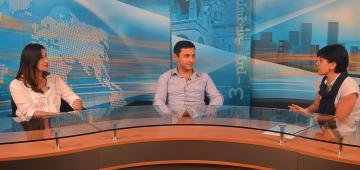 |
Expectations of the New Generation from the Velvet Revolution Outcomes
What hopes and motives did the new generation have when participating in the velvet revolution, and what expectations does the youth have from the government formed in the result of that revolution? Historians Anna Khachyan and Gor Madoyan discuss the topic.
The conversation is hosted by Anna Sargsyan.
|
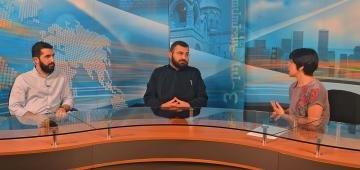 |
The Church and the Society: Old Connections and New Expectations
The Christian churches have often undergone public-political upheavals, revolts and revolutions. The Armenian Church is no exception. Church-society, church-state relations have sometimes been in solidarity, sometimes in cooperation, sometimes openly rejected. In the 20th century, the Bolshevik society, for example, burnt churches and shot priests. A few decades later, the same society, with the change of the social-political system, revealed that it is not only a follower of the church, but also the church is a key part of its identity and national wealth.
What is the status of church-society relationship in the 21st century? What does the Armenian society expect from the Armenian Church today?
Very Rev. Fr. Shahe Ananyan from the Mother See and expert in Oriental studies Varuzhan Geghamyan discuss the topic.
The conversation is hosted by Anna Sargsyan.
|
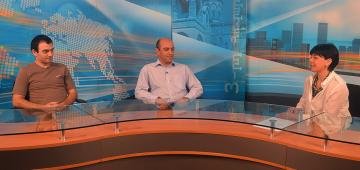 |
Uncertainty of Freedom in “New” Armenia
Public-political debates continue. Some say the revolution is just beginning, some say "yes" or "no" to the counterrevolution, some say, we do not understand what is happening. What is the mood of society, what is the diagnosis of the state organism?
The subject is discussed by cultural anthropologist Smbat Hakobyan and political scientist Saro Saroyan.
|
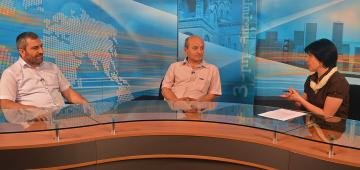 |
Political Legal System After Velvet Revolution
Velvet revolution introduced the topic of legality and law into the realm of public talks. To what extent will this potential be achieved and will the country have a political, legal and legal culture in place? The lawyer Norayr Norikyan and politician Styopa Safaryan are discussing the topic.
The conversation is hosted by Anna Sargsyan.
|
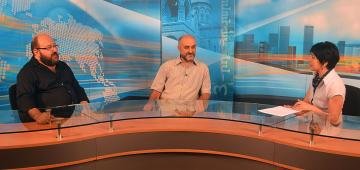 |
Cultural Policy and the Public
After the revolution, we live in open and transparent times. Everyone has the opportunity to express their thoughts, whether good and bad, meaningful and not so. How does the culture feel itself in this great noise under the headlights?
Architect Misak Khostikyan and composer Vache Sharafyan are discussing the topic of cultural policy and public.
The conversation is hosted by Anna Sargsyan.
|
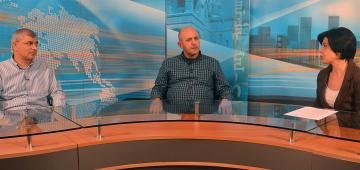 |
Tomorrow of Revolution
The outcomes of the Armenian national revolution is legitimized. The expectation of quick and fully prosperous life is in high demand just like an oxygen. How to manage time and expectations? What model of public administration to go for?
The topic is discussed by ethnologist Nikol Margaryan and an expert from International Center for Human Development Ashot Khurshudyan.
The conversation is hosted by Anna Sargsyan.
|
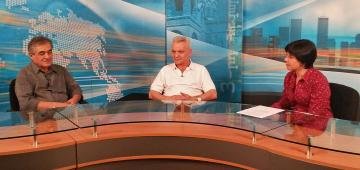 |
The Revolution and Artsakh
After the velvel revolution, the attitude towards the issue of Artsakh changed: the issue of having Artsakh back to the negotiations table as full party of the conflict reveived emotional reflection.
The relations of RA-NK as two sovereign states obtain new accents. The wave of revolution got to Artsakh as well. What are the motives of these processes? The topic is discussed by Editor-in-Chief of Analyticon magazine Gegham Baghdasaryan and the Director of the Armenian Center for Strategic and National Research Manvel Sargsyan.
The topic is discusses by ethnologist Satenik Mkrtchyan and Communication Coordinator at Transparency International Anti-Corruption Center Haykak Arshamyan.
The conversation is hosted by Anna Sargsyan.
|
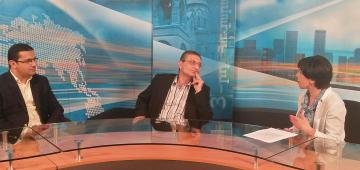 |
Armenian Church and the “New” Nation
The more harmonized and regular the national bodies work, the more viable is the nation as an organism. What are our national institutes, what specific features do they have? In which case can we have a consolidated society, when under the disguise of the wave of most recent velvet revolution now an attempt is made to change the situation in the Armenian Church, and not in the system of public administration, and moreover, using the same methods of street demonstrations.
The topic is discussed by historian Vahe Torosyan and independent analyst Hayk Balanyan.
The conversation is hosted by Anna Sargsyan.
|
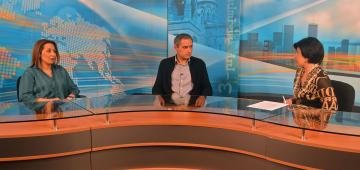 |
The Philosophy of Velvet Revolution
Philosophical thoughts applied by the public for intellectual entertainment, tend to come into life from time to time. How did the collective intellect of people get to win the intellect of authorities?
Candidates of philosophical sciences Karine Yaralyan and Movses Demirchyan talk about the velvet revolution and the philosophy of state.
The conversation is hosted by Anna Sargsyan.
|
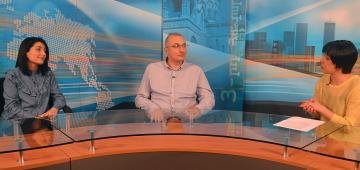 |
The Shock of Velvet Revolution and Post-Revolutionary Passions
For nearly one month, the Armenian public united its hopes and thoughts around the axle of revolution. Velvel revolution won and hundreds of thousands people gathered in the streets left. Where did public demand and expectations shift to? How are the post-revolutionary passions managed? How does the public try to overcome the post-revolutionary emotional shock?
The topic is discussed by ethnologist Satenik Mkrtchyan and Communication Coordinator at Transparency International Anti-Corruption Center Haykak Arshamyan.
The conversation is hosted by Anna Sargsyan.
|
